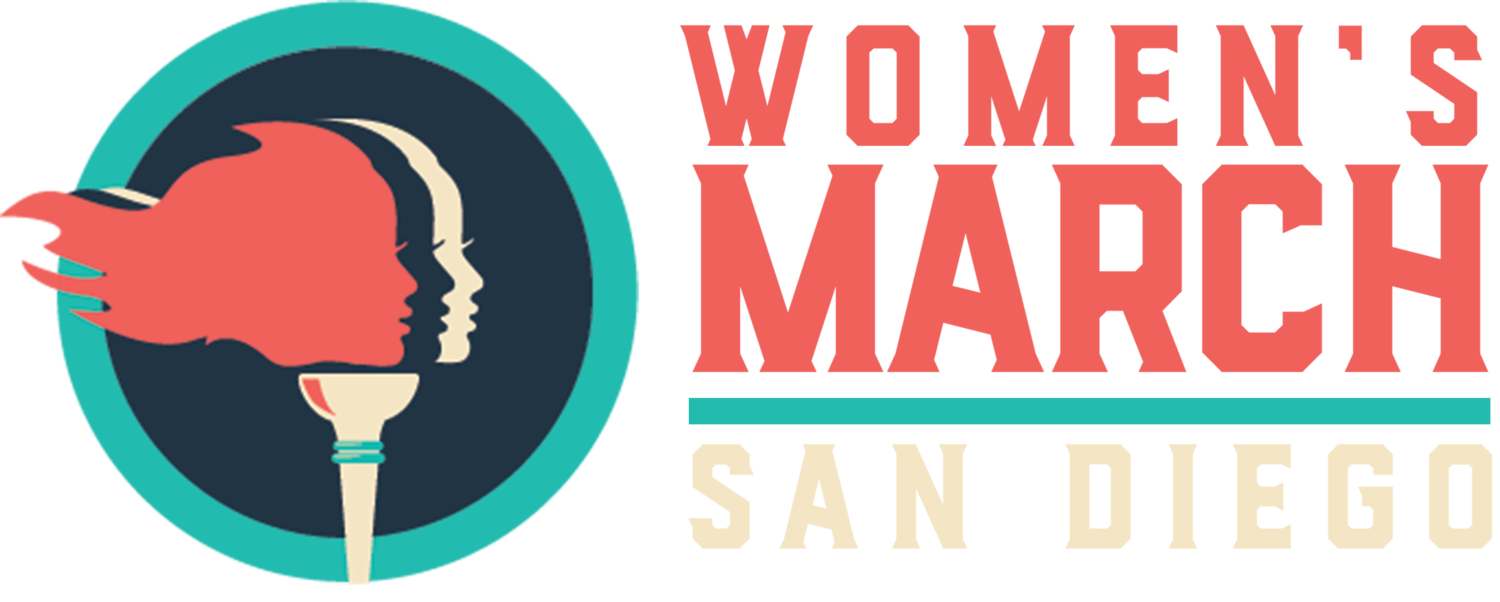Frequently asked questions
What is Women’s March San Diego?
The mission of Women’s March San Diego is to harness collective power to drive grassroots education, civic engagement, and transformative action. We support individuals and communities in protecting democracy, advancing justice, and dismantling systems of oppression across issues including gender, racial, climate, economic, and social justice—locally and nationally.
Women’s March San Diego is a movement rooted in intersectional activism across a diverse range of issues. We are empowered by the legacies of revolutionary leaders who paved the way for us to march and honor those around the globe who continue to fight for freedom and justice. They are why we march.
Why is protecting democracy part of your work?
We believe that none of our rights are secure without a functioning democracy. The threats to democratic institutions, the rise of disinformation, and increasing political violence endanger every issue we care about—from reproductive freedom to racial justice to LGBTQIA rights. We work to empower communities to vote, speak out, organize, and hold leaders accountable. Protecting democracy is not separate from our mission—it is essential to it.
Why do we continue to support marching?
Since the inaugural Women’s March on Saturday, January 21, 2017, San Diegans have continued to march in support of a range of issues, including civil rights, disability rights, ending violence, immigrant rights, LGBTQIA rights, reproductive rights, and workers rights. These peaceful demonstrations magnify the work being done by local community organizations and produce a tidal wave of voices. Today, we march not only for rights and justice—but also to protect the very democracy that makes peaceful protest possible.
What does Women’s March San Diego do to ensure safety at our marches?
Since the inaugural march, we have partnered with San Diego law enforcement and emergency response in order to address marcher safety. We acknowledge that not all members of our community feel safe among law enforcement, and that is why WMSD has a team of marshals who are trained in de-escalation.
What will Women’s March San Diego do to ensure accessibility during our marches?
It is our goal to support all marchers. Accessible restrooms, ADA seating, ASL interpretation, and an intentionally selected march route are mechanisms to ensure accessibility.
How did Women’s March San Diego (WMSD) come into being?
In San Diego, the Women’s March began with a social media post calling for action by two local women, Dawniel Stewart, and Sarah Shaftel. On Sunday, November 13, 2016, in response to the outcome of the presidential election, more than 150 community members gathered in San Diego to plan a local event. ACLU San Diego Executive Director Norma Chavez Peterson led an organized activity that laid the groundwork for the March. The march became part of the largest single-day protest in U.S. history. According to law enforcement, over 80,000 people attended the March in San Diego, joining millions across the nation and around the world. One year later, four women who led the planning efforts—Amy Epstein-Swazey, Fran Carrillo, Dr. Poppy Fitch, and Dawniel Stewart—founded Women’s March San Diego.
What activities are WMSD involved in beyond the march?
Over the past eight years, WMSD has amplified the work of organizations aligned with our Unity Principles. We support our community partners year-round through collaborative events, mobilization efforts, and direct civic engagement. In 2018, for example, we actively supported March for Science, Bridges Not Walls Rally, UCSD Walk Out, Vote! Human Banner, March for Our Lives (advisors), Families Belong Together, Pride Festival San Diego, Rally for the Dream, Rise for Climate Change, Won’t Be Erased March & Rally, Reproductive Rights Rally & March, The People’s March, and Handsoff!, to name a few. We were speakers at Tearing Down Barriers to Care Rally, Protests for the Modern Age, and interviewed by San Diego Union-Tribune, France24, and featured in a COX PSA for Women’s History Month.
WMSD is proud to be a member of Be The Vote, a community collaborative focused on the campaign to register voters and Get Out the Vote (GOTV). We provided trainings and registered voters at a variety of locations. This partnership was vital to increasing voter registration numbers in San Diego. The group included the County of San Diego Registrar's Office, League of Women Voters San Diego, NextGen, Indivisible, San Diegans Against Gun Violence, and ACLU San Diego, to name a few.
In addition to our local work, WMSD created the Immigrant Protection Handbook in English, Spanish, and Tagalog to support immigrant communities both locally and across the nation. We also launched the Activists’ Toolkit, a digital resource designed to help individuals and organizations across the country take effective, informed action to protect democracy and advance justice.
What is Women’s March California?
Women’s March California is a coalition of Women’s March chapters across the state. As an affiliate, WMSD members meet with representatives from each chapter regularly to discuss common goals and strategies, and to enact a unified strategy in our ongoing efforts to work towards the vision of a shared humanity and equity for all.
What is Women’s March San Diego’s relationship to Women’s March, Inc?
WMSD has never had a formal relationship with the Women’s March, Inc. chapter (also known as Women’s March National). WMSD does not share leadership, structure, or funding with Women’s March, Inc. chapter and does not have any input or control of their decision-making or leadership.
Hundreds of marches across the globe were formed as a result of the 2016 election. In an act of unity, most of these marches agreed to unify around branding and Unity Principles without a formalized relationship.
Is Women’s March San Diego affiliated with a national organization?
WMSD is affiliated with the national organization that was founded on the West Coast, Women’s March Foundation (WMF). WMF provides WMSD with it’s direct connection to WMCA and assists chapters like WMSD in aligning our overall movement, while providing resources and networking opportunities.
